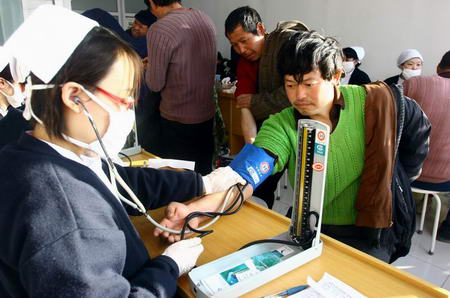The nation's major polluting industries will have to take steps to guarantee employees' health if they want to continue operating, a senior work safety official said yesterday.
Wang Dexue, deputy director of the State Administration of Work Safety (SAWS), said the firms, mainly in the minerals, chemical, textile and defense sectors, will have to obtain special health licenses.
 |
|
A worker receives free health examination in Beijing |
In order to be granted the licenses, firms will have to take a number of measures, such as cutting the amount of harmful dust inhaled by their employees.
Speaking at a press conference in Beijing, Wang said that following the reshuffle of government bureaus in March, a new division in charge of occupational safety and health supervision has been set up under the administration
The new division will ensure the strict implementation of existing laws.
Currently, there are laws on occupational disease prevention and environmental protection that require companies to follow strict guidelines on employee safety and environmental protection.
The government has also set standards on work safety that include taking into account hazardous chemical exposure, which are in line with those endorsed by the World Health Organization.
Similarly, government-backed occupational-disease hospitals have been set up nationwide to ensure more workers get proper and regular examinations.
However, experts say more needs to be done to enhance law enforcement in this field.
For example, health authorities require companies to pass workplace hazard evaluation tests, but other departments do not make it a precondition for their approval, Su Zhi, deputy director of the health supervision bureau under the Ministry of Health said.
To tackle the problem, Wang said SAWS will draw up detailed rules to regulate health conditions in the industries concerned.
"Those companies that fail to meet relevant standards should be punished," Wang said, adding that they may even have their licenses revoked.
Of the 758 million workers in the country's 16 million industrial firms, nearly 200 million come into contact with various work-related hazards, according to figures from the Ministry of Health.
By the end of 2006, there were 676,562 reported cases of people suffering from occupational diseases, mainly including pneumoconiosis, caused by long-term exposure to mineral or metallic dust.
Official data also showthat economic losses caused by occupational diseases and workplace injuries amount to 300 billion yuan ($43.7 billion) every year.
The country's law on prevention and control of occupational disease, which took effect in May 2002, stipulates that either labor insurance or the employers themselves must cover the fees, but only if a contract is signed beforehand.
However, many employers, driven by their desire to make quick profits, often refuse to compensate employees suffering from work-related diseases.
In 2006, unresolved medical disputes involving occupational diseases were the fifth-most common form of public petition submitted to the Ministry of Health, Xue Xiaolin, a division chief at the ministry in charge of handling petitions, said.
Some long-running disputes have blown up into mass incidents, which severely undermines public security, Xue told China Daily earlier.
(China Daily August 10, 2008)